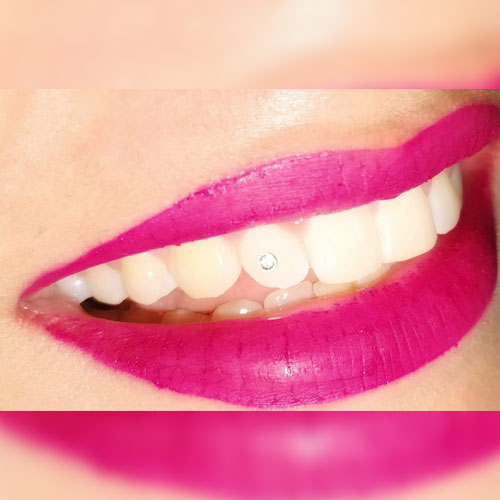-
Appointment Booking
[email protected] -
Call Us Now
+91-11-41627127, +91-9818465668

Tooth Jewelry is the latest trend in the world of dentistry and you can get one for yourself from the top tooth jewelry dentist in Delhi. Made out of sterilized and certified rhinestones, tooth jewellery is available in a wide variety of shapes, colours, designs and sizes. Dr. Sahni’s Dental Clinic is the best tooth jewelry clinic in Delhi, where you can get your tooth jewelry with no pain or discomfort.
Visit the best tooth jewelry clinic in Delhi for a painless procedure, with no side effects or damage to your teeth. Stand out from the crowd with the latest oral fashion statement provided to you by the best tooth jewelry dentist in Delhi at Dr. Sahni’s Dental Clinic.
Oral fashion statement to stand out in crowd, Tooth jewelry is small rhinestone jewel available at our clinic in different designs, shapes and colors. The procedure is absolutely painless and is quick.
Catch up the trend and add sparkle to your smile!!
What are the best questions to ask a dentist?
When visiting a dentist, ask about preventive care strategies tailored to your needs, including oral hygiene tips and dietary recommendations. Inquire about any identified dental issues, their causes, and available treatment options. Discuss the frequency of dental check-ups suitable for maintaining optimal oral health. Request details about any recommended procedures, understanding their benefits and potential risks. Clarify the anticipated outcomes and recovery processes. Ask about payment plans or insurance coverage for better financial planning. Inquire about emergency dental care availability. Establish open communication regarding any concerns or anxieties. Lastly, seek guidance on maintaining a healthy oral care routine at home between appointments.
What are the disadvantages of tooth jewelry?
Tooth jewelry, while trendy, comes with disadvantages. Adhering jewels to teeth can compromise oral health, creating hiding spots for bacteria and plaque, potentially leading to decay or gum issues. The attachment process may require enamel removal, weakening the tooth. There's a risk of allergic reactions to the materials used in the jewelry. Additionally, oral injuries can occur if the jewel loosens or detaches. Cleaning around the jewelry can be challenging, increasing the likelihood of hygiene-related problems. Dentists may advise against tooth jewelry due to these concerns, emphasizing the importance of maintaining oral health over cosmetic trends.
How is tooth jewelry applied?
Tooth jewelry application is a non-invasive, painless process performed by a dentist or dental professional. The chosen tooth is cleaned and dried before applying a mild acid to create a rough surface for better adhesion. A safe dental adhesive is then used to affix the jewel onto the tooth's surface. For some types of tooth jewelry, a small drill may be used to create a tiny hole in the tooth where the jewel is secured. The entire procedure is quick, usually taking around 15-30 minutes. Proper care and hygiene are essential post-application to prevent complications and maintain oral health.
What is the material of tooth jewelry?
Tooth jewelry is typically made from biocompatible materials to ensure safety within the oral environment. Common materials include small crystals or gems made of glass or crystals, which are FDA-approved and safe for dental use. Some tooth jewelry may also be made from gold or other metals. It's crucial to choose materials that are non-reactive and won't cause allergies. The attachment to the tooth is usually done with dental-grade adhesives. The selection of materials should prioritize oral health, and individuals considering tooth jewelry should consult with a dentist to ensure the chosen materials are safe and suitable.
What is the life of tooth jewelry?
The lifespan of tooth jewelry varies depending on factors like oral care, habits, and the type of adhesive used. On average, tooth jewelry can last from a few months to a couple of years. However, proper oral hygiene practices, such as regular brushing and flossing and avoiding habits like teeth grinding, can extend its longevity. The adhesive's quality and the type of jewelry material also influence durability. It's common for individuals to replace or remove tooth jewelry during routine dental check-ups or if issues arise. Consulting with a dentist can provide personalized advice on maintaining and preserving tooth jewelry.